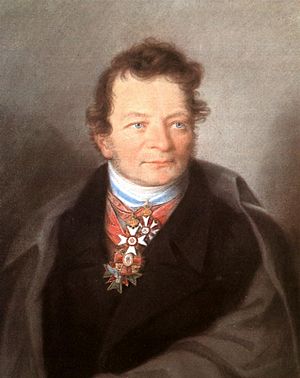Paul Johann Anselm Ritter von Feuerbach facts for kids
Quick facts for kids
Anselm von Feuerbach
|
|
|---|---|
 |
|
| Born |
Paul Johann Anselm Ritter von Feuerbach
14 November 1775 Hainichen, Saxe-Weimar, Holy Roman Empire
|
| Died | 29 May 1833 (aged 57) Frankfurt, German Confederation
|
| Children | 8 |
| Academic work | |
| Notable works | reform of the Bavarian penal code |
Paul Johann Anselm von Feuerbach (born November 14, 1775 – died May 29, 1833) was a very important German expert in law. He is famous for changing the laws in Bavaria, a part of Germany. His changes helped stop the use of torture and became a guide for other countries. He also studied the mystery of Kaspar Hauser, a famous foundling.
Contents
Life and Work of Anselm von Feuerbach
Anselm von Feuerbach was born in Hainichen, near Jena. His family moved to Frankfurt on Main when he was young. He ran away from home at 16 to study at the University of Jena. Even though he was often sick and very poor, he learned quickly.
Early Studies and Marriage
In 1795, Feuerbach earned his philosophy degree. He also got married that same year, even with little money. This marriage pushed him to study law, which he didn't love at first. However, law offered him a faster path to success.
New Ideas in Law
At 23, Feuerbach became well-known for his strong opinions on law. He believed that judges should follow the written laws very strictly. This idea was new and led to a group called "Rigorists" who supported him.
Feuerbach also created a famous rule: "There is no crime and no punishment if no law existed at that time." This means you can't be punished for something that wasn't against the law when you did it.
Becoming a Professor
In 1801, Feuerbach became a law professor at the University of Jena. The next year, he moved to Kiel to teach there for two years.
Reforming Bavarian Law
His most important work was creating new laws for Bavaria. In 1805, King Maximilian Joseph asked him to write a new set of criminal laws for Bavaria. Feuerbach moved to Munich and became a high-ranking official in the Ministry of Justice.
Ending Torture
One of his biggest achievements was helping to end torture in Bavaria in 1806. This was a major step forward for human rights.
Famous Crime Cases
Feuerbach also wrote books about interesting crime cases he dealt with. He wanted to use these cases to help people understand how criminals think. He hoped this would help judges and investigators. These books are now seen as important historical records of life in Bavaria.
Views on Jury Trials
In 1811, Feuerbach wrote about jury trials. He thought that a jury's decision alone wasn't enough proof of a crime. This caused a lot of discussion at the time.
Impact of His Work
The new Bavarian criminal laws, finished in 1813, had a huge impact. Other German states, like Württemberg and Saxe-Weimar, used them as a guide. Some even adopted them completely. Other countries also translated his laws.
Later Career and Kaspar Hauser
In 1814, Feuerbach became a judge in Bamberg. Later, he became the head judge in Ansbach. He also traveled to France and Belgium to study their legal systems. He wrote about the importance of having open and public legal proceedings.
In his later years, Feuerbach became very interested in the mysterious case of Kaspar Hauser. Kaspar Hauser was a young man who appeared in Nuremberg with no memory of his past. Feuerbach wrote a book about the facts of Kaspar Hauser's life in 1832.
Feuerbach died on May 29, 1833, in Frankfurt. There is some mystery around his death. His family believed he might have been poisoned because of his work on the Kaspar Hauser case. Kaspar Hauser himself died under suspicious circumstances later that same year.
Feuerbach's Family
Anselm von Feuerbach had five sons and three daughters. Some of his children also became well-known in their own fields. His children were:
- Joseph Anselm Feuerbach (1798–1851)
- Karl Wilhelm Feuerbach (1800–1834)
- Eduard August Feuerbach (1803-1843)
- Ludwig Andreas Feuerbach (1804–1872)
- Heinrich Friedrich Feuerbach (1806–1880)
- Rebecca Magdalena (1808–1891)
- Leonore Feuerbach (1809-1885)
- Elise Feuerbach (1813–1883)
Writings
- Feuerbach, Paul Johann Anselm, Ritter von: The Wild Child The unsolved mystery of Kaspar Hauser. Translated from the German with an Introduction by Jeffrey Moussaieff Masson/ NY Free Press 1997 1st ppb ptg ISBN: 0-684-83096-5
- Paul Johann Anselm von Feuerbach/Gerold Schmidt, "Alltag im Alten Bayern", Norderstedt (Books On Demand GmbH) 2006, 357 pages (with local register and index of names) ISBN: 978-3-8334-6060-9
See also
 In Spanish: Paul Johann Anselm von Feuerbach para niños
In Spanish: Paul Johann Anselm von Feuerbach para niños
- List of unsolved deaths
 | Misty Copeland |
 | Raven Wilkinson |
 | Debra Austin |
 | Aesha Ash |

